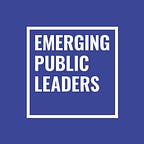The Future is Now — Promoting African Youth Engagement in Global Climate Change Conversations
By Elizabeth Ofori, Senior Program Associate at Emerging Public Leaders Ghana
Last week, world leaders gathered in Glasgow for the 26th Climate Change Conference, also known as COP26, where the global community recommitted to help mitigate global climate change.
Ahead of COP26, individuals across different sectors from all over the world — scientists, activists, event planners, entrepreneurs, CEOs, investors, actors, government officials, and others — gathered at the TED Countdown Summit in Edinburgh, Scotland to seek answers to fundamental, interconnected questions around climate change and conceptualize the blueprint for a clean energy future. From October 12 to 15, participants discussed how to build a safer, cleaner and fairer world for all by cutting greenhouse gas emissions in half by 2030 and creating a zero-carbon future.
Representatives from Emerging Public Leaders, myself included, were invited to offer our perspective on achieving a net-zero future. The conference provided a unique opportunity to join one of the largest international idea-sharing platforms and interact with like-minded young leaders and professionals from Africa and beyond. Young African professionals must have a seat at the table for these global conversations to ensure the solutions consider our unique perspectives and dynamics.
Regardless of where you come from, we’re all impacted by climate change. Unfortunately, many Africans are unaware of how climate change affects us as changes in different parts of the continent have been more gradual than catastrophic. In regions with different seasons and temperate climates, people are experiencing more extreme weather conditions: much colder winters and unbearably hot summers. In island nations, the impact is even more tangible, hurricanes are more frequent and destructive, and the land is gradually submerging underwater. In sub-Saharan Africa, the temperature does not change much during the year — it’s hot all year round. People notice that it is hotter and that it rains more frequently lately, but they don’t necessarily connect the increase in heat and the change in rain patterns with climate change because the change has been gradual and not dramatic.
Just because we may not notice the day-to-day effects of climate change does not mean we are not impacted. In fact, in the long run, Africa will bear the brunt of the negative effects of climate change.
Africa’s environmental problems and dynamics need to be prioritized during ongoing conversations like the TED Summit and COP26. If our reality and what is relevant and practical for our environment is not clearly articulated at these international forums, we will miss out on the critical opportunities to benefit from the global solutions that emerge from them.
It’s particularly important for African youth to offer their perspectives in these forums and conversations because the future is now. Decisions are being made today, and if young leaders like EPL Fellows do not participate in the discussion and contribute to solutions, then we are depriving ourselves of the opportunity to build a better world for ourselves and our children for generations to come.
Sadly, many barriers continue to limit our participation in these conversations, including the TED Countdown summit. Firstly, it took longer than usual for us to receive a response on our visa application, which we were ultimately not able to obtain, shutting us out from participating in person in the summit. We were left without any clear answers on why we were denied, despite having letters from TED and EPL certifying the trip was fully funded and all participants were gainfully employed. At the same time, the UK, EU and many other countries continue to discriminate against the vaccines available in most African countries — vaccines they have committed to making available through COVAX.
This process and decision reflect the discrimination and hurdles that many Africans face when trying to participate in global conversations. In our attempt to have a say in these conversations and the formulation of policies that impact our countries, Africans need to jump through additional hoops. As a result, many “solutions” implemented in Africa are designed by people who do not understand African countries and societies. Outsiders impose their agenda and solutions on us.
As climate change has a universal impact, we were thrilled at the idea of joining the TED Summit in person to focus on finding innovative solutions with individuals from all over the world. While we could not participate in person, we were glad to join virtually, offer our perspectives, and share ideas with others. The connections that we built before and during the summit are invaluable. Most importantly, we shared Africa’s side of the story as leaders from all over the world put forth some of the most creative ideas and proposals to achieve a net-zero future.
Elizabeth Ofori is a Senior Program Associate at Emerging Public Leaders Ghana.
